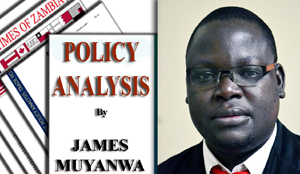 AS a tribute towards Zambia’s Golden Jubilee, this week I want to look at one of the fundamental constitutional office of the Republic – the Auditor General’s office.
AS a tribute towards Zambia’s Golden Jubilee, this week I want to look at one of the fundamental constitutional office of the Republic – the Auditor General’s office.
The Office of the Auditor General (OAG) has posted immense successes during the last 50 years of Zambia’s Independence amid diverse challenges.
Dating back to pre-independence era, it has gone through major changes particularly since 2003 when its major and unprecedented restructuring drive began.
Office holders
Zambia has had only three nationals serving as Auditors General since ndependence, the situation which can be attributed to the security of tenure for the office and the suitability of its holders.
Because it was difficult to find a suitably qualified auditor immediately after Independence in 1964, a white man, John Bourne, occupied the office until 1972 when the first Zambian was appointed.
According to information obtained from the OAG recently, during the British rule, the country was under the constitutional responsibility of the Secretary of State for colonies who established the colonial audit service and appointed it’s Director-General.
The colonial audit service was not part of the office of the Comptroller and Auditor-General in the United Kingdom, but an internal audit function intended to assist the Secretary of State in managing
the affairs of the colony.
After independence, the colonial audit service became the Audit Office to provide external audit for the government, and the colonial audit staff remained as civil servants in the Audit Office.
The head of the colonial audit service became the Auditor General and the Office remained a department under the Ministry of Finance.
Mr Bourne ran the office until 1971 and he was succeeded by the first Zambian, Tubbs Nundwe (late), who occupied the office from 1972 to 1992.
Not much is recorded in that 20-year period except the fact that following Independence, the nation established its own Constitution whereby the appointment of the Auditor General and the functions of
the OAG became constitutional.
In 1995, Frederick Siame was appointed by the new government of President Frederick Chiluba and served up to 2002.
Dr Anna Chifungula, who currently occupies the position, was appointed as the first female Auditor General for Zambia in 2003.
Reforms Ms Chifungula whose ascendance to the office seemingly heralded the beginning of major reforms as late President Mwanawasa kick-started his regime, was the only chartered accountant for the entire
establishment in 2003.
Interestingly, she now heads the institution with more than 200 other professionals holding that qualification or better.
A peek into her reign shows that Dr Chifungula could be ascribed as the pioneer of the reforms in the office following her appointment in July 2003.
In a document dubbed
“Working life for Anna O Chifungula,” the Auditor General whose public service spawned in 1975, says, when she was appointed, the office had only 96 audit staff to cater for the
entire country.
“I felt as if I had been demoted coming to a place that looked more dead than alive, but (then) Secretary to Cabinet, Leslie Mbula convinced me to give it a try,” said Dr Chifungula who, prior to that served as Ministry of Finance Permanent Secretary among other top positions.
Dr Chifungula says she immediately embarked on the recruitment of auditors because the 96 were too few, considering that the audit reports were four years behind.
The morale among the workers was low while the institution was least funded and, therefore, she signed an agreement with the Norwegian government for financial and material assistance to the office.
Sucesses and recognotion
The staff requirement at the time was 214. In November 2003, 18 auditors from outside the civil service were recruited.
“In December 2003, we managed to complete and edit the 2000/2001 and 2002 reports. This involved working with a team of 20 dedicated officers, who included my current Deputy Auditor General, Mr Ron
Mwambwa … through the nights to produce those reports,” she says.
The OAG then embarked on further recruitment and retraining of the officers with 200 new entrants reporting for work by April 1, 2005.
Two Deputy Auditors General, seven directors, 11 deputy directors and nine assistant directors were also employed.
New departments were further created, thereby increasing the staff establishment to 580 and with nearly 350 auditors mostly paid by the Norwegian Government.
“Currently because of the continued assistance from the Netherlands and Norway, we have trained and retained 200 chartered accountants, who have ACCA, CIMA or ZICA professional.”
In 2008, provincial offices were built and the following year district auditors were also recruited for 36 districts.
Currently, the OAG has 460 well-qualified auditors while the new buildings are able to accommodate all staff.
In the last 10 years the office has produced all the reports on time, that is, by December 31 of each year.
Special reports such as parastatal reports, performance, information technology audits and forensic audit reports are also being produced timely.
In terms of coverage, the audit has increased from 20 per cent in 2003 to 85 per cent in 2013.
“I was awarded a life time achievement award by ACCA in 2008 and in 2013, the Zambia Institute of Chartered Accountants also bestowed such an award on me.”
For five years – from 2007 to 2012 – the office was appointed by the European Union (EU) to assist in the reconstitution of the Audit Office of Liberia.
She says that the work that has been put into the office has resulted in its recognition as it continues promoting good governance and accountability.
Comments: 260 0955 431442, 0977 246099, 0964 742506 or
email:jmuyanwa@gmail.com






